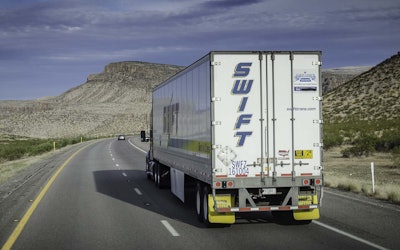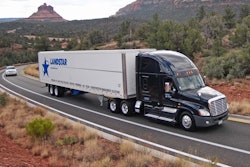 Swift is reportedly the latest carrier to find a work-around to using independent contractors in California after recent court rulings have presented mounting challenges to the traditional owner-operator leasing model.
Swift is reportedly the latest carrier to find a work-around to using independent contractors in California after recent court rulings have presented mounting challenges to the traditional owner-operator leasing model.The chilling effect that an April 2018 ruling by the California Supreme Court has had on the owner-operator lease set-up in California appears to be in the works at one of the nation’s largest carriers.
One alternative to leasing relies on brokered loads to new independents instead of contracting with them under the traditional leasing model. The practice is seen as a work-around following a California court decision that casts doubt on the legality of owner-operator leasing in the state.
The trend is affecting carriers of all sizes, says Joe Rajkovacz, head of government affairs for the Western States Trucking Association.
That might include Swift Transportation, a wing of the Knight-Swift conglomerate that operates upwards of 30,000 trucks, including nearly 5,000 owner-operators. Officials from Swift and its parent company, Knight-Swift Holdings, did not respond to CCJ’s inquiries on the topic.
Swift is reportedly ending its arrangements with leased owner-operators based in California, if they do not satisfy certain conditions. Some are being encouraged to transition to independents, say Rajkovacz and two Swift owner-operators.
Rajkovacz says his group is helping some operators obtain their authority as they transition to an independent operation.
Two owner-operators affected by the move confirmed they have received notice from Swift that they must make a decision by March 2. Both operators declined to speak for attribution.
It’s unclear how many owner-operators such a policy could affect, and if the policy would apply to all owner-operators based in California and leased to Swift or any of its sister companies, such as Knight and Barr-Nunn. Rajkovacz estimates that, given Swift’s and Knight’s heavy presence in the West, it could be as high as 20 percent of the companies’ owner-operators – about 1,000 of the 5,000 total.
One owner-operator, who owns his truck outright, told CCJ he was presented with options by management at his Los Angeles-area operation to either become a company driver to continue working the dedicated, local/regional account he typically serviced, or to obtain an out-of-state address and run more than 50 percent of his miles outside of California.
An operations employee of Swift in Southern California, not speaking for attribution, confirmed some of these details before referring further questions elsewhere. The employee said the move reflects the company’s response to the California high court’s Dynamex v. Superior Court of Los Angeles decision last year. The court used the so-called ABC test for determining appropriate independent contractor classification.
The decision is facing multiple court challenges. In addition to WSTA, the California Trucking Association is also suing, hoping to see a federal court overrule the California Supreme Court’s decision.
Combined with the U.S. Supreme Court’s decision regarding forced arbitration, coming in the case of New Prime v. Oliveira, the rulings create a difficult legal environment for independent contractor-type relationships in California.











